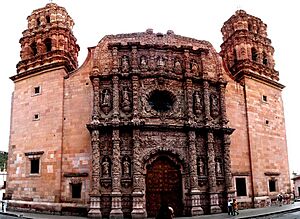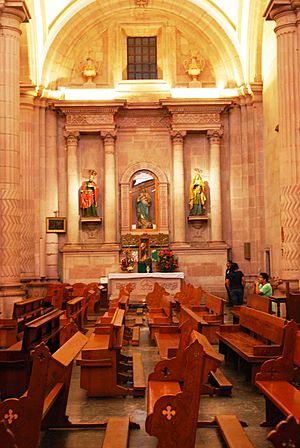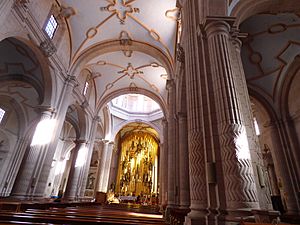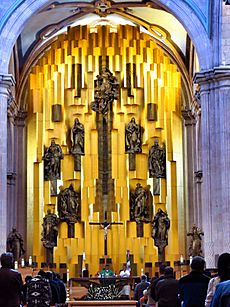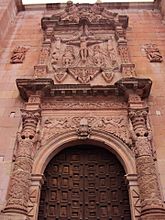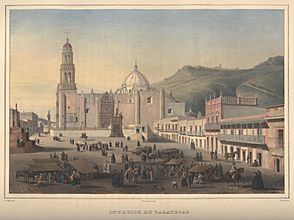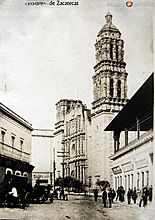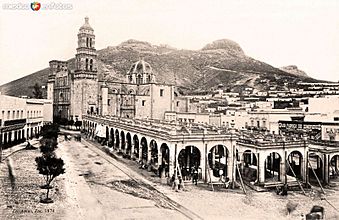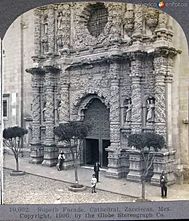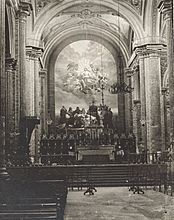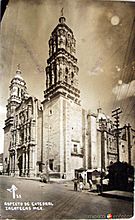Cathedral Basilica of Zacatecas facts for kids
Quick facts for kids Cathedral Basilica of Zacatecas |
|
|---|---|
|
Catedral Basílica de la Asunción de María de Zacatecas
|
|
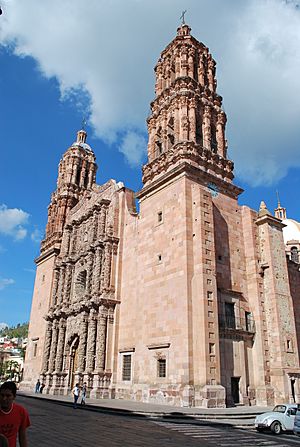
Cathedral of Zacatecas
|
|
| Religion | |
| Affiliation | Roman Catholic |
| District | Diocese of Zacatecas |
| Ecclesiastical or organizational status | Cathedral and minor basilica |
| Year consecrated | 1752 |
| Location | |
| Location | Zacatecas, Mexico |
| Architecture | |
| Architect(s) | Domingo Ximénez Hernández |
| Architectural style | Churrigueresque, New Spanish Baroque, Neoclassical |
| Groundbreaking | 1731 |
| Completed | (Rest of the church) 1752 (Top of North tower) 1904 |
| Spire(s) | 2 |
| Official name: Part of the Historic Centre of Zacatecas | |
| Type: | Cultural |
| Criteria: | ii, iv |
| Designated: | 1993 (17th session) |
| Reference #: | 676 |
| Region: | Latin America and the Caribbean |
The Cathedral of Zacatecas is a beautiful and important church in Zacatecas City, Mexico. It is dedicated to the Virgin of the Assumption. This amazing building is the main church for the Diocese of Zacatecas. It stands proudly in the historic center of the city, which is a World Heritage Site recognized by UNESCO.
Contents
A Look Back: The Cathedral's History
The Cathedral of Zacatecas you see today is not the first church built on this spot. Before it, there were two other temples.
Early Churches in Zacatecas
- The very first church was built in 1568. It was the city's parish church, but it was quite small.
- A second, larger church was built in its place. We know it was officially opened in 1625.
Building the Grand Cathedral
The current cathedral is the result of a long building process that started way back in 1550. Over 170 years, there were many changes, additions, and even some fires. Finally, in 1732, a big plan was made to build the church we see now. The goal was to create a much larger and grander temple for Zacatecas, a city famous for its silver mines.
Construction of the current building began in 1731 and was mostly finished by 1752. The main architect was Domingo Ximénez Hernández. The first stone was laid by Don José de Izarraguirre. The church was dedicated in 1752, but it wasn't fully completed until 1904. That's when the top of the front part and the north tower were finished. The north tower even has a clock, which was a gift from Governor Genaro García Rojas.
Special Entrances
The cathedral has three main entrances, called facades.
- The northern facade is dedicated to the Santo Cristo de la Parroquia. Old miners believed this Christ figure was very miraculous.
- The southern facade honors Our Lady of the Zacatecas, who is the city's patron saint.
- The main facade was completed on April 24, 1745. It is inspired by the idea of Holy Communion. You can see carvings of God the Father, the Son, and the Holy Spirit, along with the Apostles, all around the main window.
On January 26, 1863, Pope Pius IX made the church a cathedral. This meant it became the main church for the new Diocese of Zacatecas.
Exploring the Cathedral Building
The cathedral's floor plan looks like a Latin cross. It has three main sections inside: a large central area and two smaller side areas. The outside of the building is made of beautiful pink stone. The entrances and towers are very detailed.
The original dome was later replaced. The new dome is octagonal, meaning it has eight sides. It has a lantern on top, which is a small tower with windows, and is crowned by a wrought iron cross.
The Main Facade: A Stone Masterpiece
The main facade is incredibly detailed, almost like lace carved from stone. It has three main parts.
- The first part has three columns with fancy tops. These columns are decorated with angels and plants, like grapevines. Between the columns are statues of St. James, St. Peter, St. Paul, and St. Andrew. The main entrance arch is also decorated with patterns, angels, and flowers.
- The second part has a large window for the choir. This window is surrounded by detailed carvings of plants and figures. In the corners, you can see statues of four important church leaders: St. Gregory the Great, St. Jerome, St. Augustine of Hippo, and St. Ambrose of Milan. More columns and saint statues are also found here.
- The third, smaller part has five statues. Four are apostles, and the central one is Jesus Christ.
At the very top of the facade, there's a carving showing the glory of God the Father. It's like he's watching over the whole scene. People say the color of the stone on the facade changes with the sunlight throughout the day. The best time to see it is between 2:30 PM and 6:00 PM.
The Side Entrances
The cathedral also has two side entrances.
- The northern entrance is dedicated to the Lord of the Parish. It has an arch decorated with plants and angels. There's a stone copy of a Christ figure that is inside the church.
- The southern entrance is dedicated to Our Lady of Zacatecas. Her statue is in a special spot. Legend says an artist who was sentenced to death carved this statue, and it saved his life! This facade also has two parts, decorated with columns and plant designs.
Inside the Cathedral
When you step inside the cathedral, you'll notice it looks very different from the outside. The interior is simpler and more practical, with large columns and side altars in a style called Neoclassical. On the arches, you can see symbols related to Mary, figures of saints, and other religious items.
The cathedral has a special main altar designed by artist Javier Marín. This altar is covered in 24-carat gold! It is 17 feet tall and 10 feet wide. It used about 25 kilograms (55 pounds) of gold from the Mazapil area in Zacatecas. The altar is made of Finnish birch wood, which is very strong and doesn't change with humidity. It weighs about 20 tons.
The altar has eleven images of saints. At the very top is the Virgin of the Assumption, to whom the church is dedicated. On her sides are her parents, Saint Anne and Saint Joachim. Below them are Saint John the Baptist, Saint Augustine, Saint Francis, Saint Dominic, Saint Anthony of Padua, and Saint Ignatius of Loyola. On the sides, you can see images of two Zacatecas martyrs, San Mateo Correa and Blessed Miguel Agustín Pro. The cross on the altar is made of bronze and is 4.2 meters (about 14 feet) tall and 2 meters (about 6.5 feet) wide.
The Main Altarpiece: A Changing Centerpiece
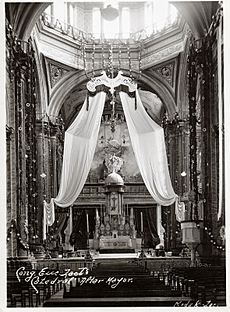
The third church building, which became the cathedral, originally had fancy wooden altarpieces. These were later replaced with stone ones, possibly designed by architect Manuel Tolsá between 1803 and 1847. The largest one was taken down in 1852, leaving an empty space.
Later, a first "cypress" (a type of altarpiece) was built in 1852. This stayed until 1895. Then, a second, smaller one replaced it. To fill the space, a painting of the Assumption of the Virgin was added in 1913. This painting was removed in 1920, leaving only a marble cypress. Finally, in 1964, this marble cypress was also removed.
The current main altarpiece, designed by artist Javier Marín, was started and finished in 2010. As mentioned, it's covered in 24-carat gold leaf, using 25 kilograms of gold from Mazapil. It's made of strong Finnish birch wood and weighs about 20 tons. This altarpiece features eleven images of saints, with the Virgin of the Assumption at the top.
Gallery
See also
 In Spanish: Catedral basílica de la Asunción de María (Zacatecas) para niños
In Spanish: Catedral basílica de la Asunción de María (Zacatecas) para niños
- Atrial cross
 | Jackie Robinson |
 | Jack Johnson |
 | Althea Gibson |
 | Arthur Ashe |
 | Muhammad Ali |


